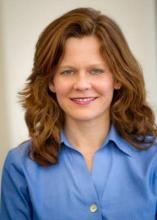The rate at which young women diagnosed with breast cancer are undergoing genetic testing for BRCA1 and BRCA2 mutations has increased, investigators report online in JAMA Oncology.
In a study of 897 women aged 40 years and younger diagnosed with breast cancer at any one of 11 academic or community medical centers, 780 (87%) reported undergoing BRCA testing within the first year after diagnosis, reported Dr. Ann H. Partridge of the Dana-Farber Cancer Institute, Boston, and her associates (JAMA Onc. 2016 Feb 11. doi: 10.1001/jamaoncol.2015.5941).
Among the 780 women who had BRCA testing, 59 (7.6%) reported a BRCA1 mutation, 35 (4.5%) reported a BRCA2 mutation, and 35 (4.6%) reported an indeterminate result or variant of unknown clinical significance, the investigators said.
The frequency of testing increased over time. Of 39 women diagnosed with breast cancer in 2006, 30 (76.9%) elected to have testing, but by 2013, 123 (95.3%) of 129 women diagnosed with breast cancer reported BRCA testing.
The investigators attribute the increasing frequency of BRCA testing to the fact that most women in the group were insured, educated, and treated at cancer centers where comprehensive genetic counseling and testing services were widely available, but they also acknowledged the possibility that media attention to genetic breast cancer (in other words, the Angelina Jolie effect) may have motivated more women to bring up the issue of genetic risk with their physician or genetic counselor.
The study can be found online here.
lnikolaides@frontlinemedcom.com
On Twitter @NikolaidesLaura


